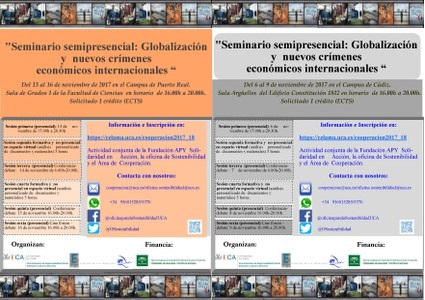Seminario Semipresencial: Globalización y nuevos Crímenes Económicos Internacionales 13 November 2017
OBJETIVOS:
1. Divulgar entre la comunidad universitaria los resultados de la investigación “Las formas contemporáneas de victimización. Los crímenes económicos contra la humanidad”
2. Sensibilizar a la comunidad universitaria sobre la naturaleza y las consecuencias de los fenómenos de naturaleza económica que tienen un impacto sobre los derechos humanos de la ciudadanía.
3. Discutir y desarrollar el concepto de crímenes económicos contra la humanidad
4. Abordar los retos y los desafíos de la comunidad universitaria para enfrentar formas contemporáneas de victimar a la población
Más información: https://celama.uca.es/cooperacion2017_18/formacion/GlobalizacionPuertoReal


